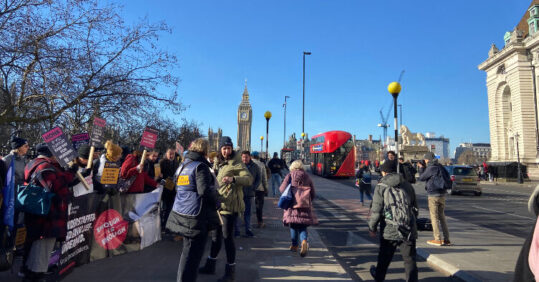Exclusive: RCN president says Government ‘punishing patients’ amid nurse strike escalation

In a significant escalation of strike action, the Royal College of Nursing has today announced that emergency, intensive, and cancer nurses will now be among those taking part in a 48-hour strike next month.
As part of the union’s first ever two-day strike nurses from over 120 NHS employers in England will walk out on strike from 6am Wednesday 1 March to 6am on Friday 3 March. This is a major departure from previous strikes, which only took place during day shifts and for 12 hours.
March’s strike will also be the first to involve nurses working in a number of departments that had previously been exempt from industrial action including emergency departments, intensive care units, and cancer care wards.
Speaking today, RCN president Sheilabye Sobrany told Nursing in Practice that ‘our members believe they have no choice because we’re going to lose more nurses’.
Related Article: NHS 10-year plan: What does it mean for nursing?
She continued: ‘This is about negotiating. We would stop strikes tomorrow if the Government came to talk to Pat Cullen, our general secretary, but they haven’t, and it seems that they are going to be punishing the patients on this occasion.’
In response to concerns of patient safety, Ms Sobrany said: ‘Since the nursing strikes started every measure has been taken at every level to ensure patients are safe, but prior to going on strike patients’ lives were at risk because of the dwindling number of experienced nurses.
‘I’m sure the Government are well aware that short staffing has impacted patients severely. We’ve taken every step to try and get our Government to listen to us and to come and negotiate, but they haven’t come.
‘These strikes will not just run for longer and involve more people but will leave no area of the NHS unaffected. Patients and nurses alike did not want this to happen.
Related Article: Funded nurse workforce plan needed for neighbourhood health services
‘By refusing to negotiate with nurses, the Prime Minister is pushing even more people into the strike. He must listen to NHS leaders and not let this go ahead.
‘I will do whatever I can to ensure patient safety is protected. At first, we asked thousands to keep working during the strikes but it is clear that is only prolonging the dispute. This action must not be in vain – the Prime Minister owes them an answer.’
The RCN says it is is still in ongoing discussions with the NHS at a national level as part of a commitment to ‘life and limb care’. Services will be reduced to an absolute minimum and the RCN is asking hospitals to rely on members of other unions and other clinical professions to maintain levels of care.
In addition, the union is increasing the financial support paid to members who lose a day’s wages through striking. The initial strike benefit rate will be increased from £50 to £80 per day, with the rate increasing to £120 from the fourth day of action.
Related Article: Over one million children living in homes causing asthma and chronic illness
Ms Sobrany told Nursing in Practice that this was to support ‘those nurses who have been out consistently supporting every one of those strikes’.

See how our symptom tool can help you make better sense of patient presentations
Click here to search a symptom




